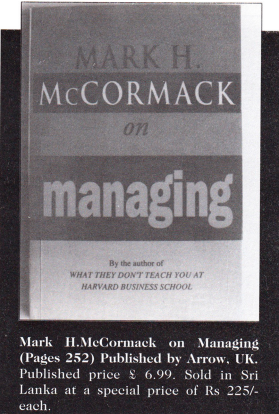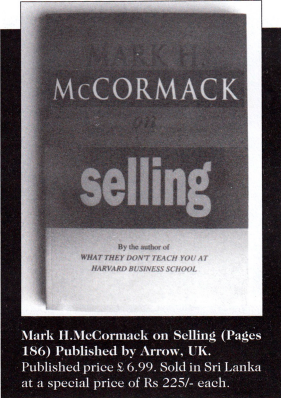
Vijitha Yapa, Chairman of the Vijitha Yapa Group of Companies, is founder editor of 3 national newspapers (The Island, Sunday Island and Sunday Times). He is the Sri Lanka correspondent for a number of foreign publications including The Times, London
The choice of information available on Management today, is very wide as the range is limitless, from surfing on the internet, discovering the latest trends, to videos and audios of management techniques from experts. But inspite of all these modern props, there is none to beat a good book.
There are many in the top management who hire a good chauffeur to take the strain off driving and then spend hours sitting in front of a square screen and creating much eye strain in the process. But there is one thing the computer cannot do compared to what you can do with a book. The obvious is of course that one can’t curl up in bed with it, with a soft pillow to rest your head on and a pen or pencil on hand to mark specific sentences passages which capture your attention.

Each month, I hope to give a roundup of books related to business management so that those in the corporate world know what is going on around them. This month I feature two books by Mark H.McCormack published by Arrow Business Books of UK offered at a special rate in Sri Lanka which is about a third of the published price.
Mark McCormack gained fame with his book “What they don’t teach you at Harvard Business School”. He is the founder and CEO of the International Management Group(IMG) which has 67 offices in 26 countries. Their main strength is the diverse organisations they represent, which include Wimbledon, the Nobel Foundation and the Olympic Games.
He warns at the outset that he is not a management guru, who has an all encompassing theory that will cure all that ails an organisation, what we in Sri Lanka would describe as a “Kokatath Thailaya” man. He is the first to admit that a part of his brain shuts down when he hears guru buzzwords like ‘paradigm’ and ‘re-engineering’ and ’empowerment’. He says they have value but if only one remembers that any buzzword, no matter how clever or attractive, must eventually run through that unpredictable filter known as people. “A management concept is meaningless without a shrewd understanding of people”, he warns.
In countries like Sri Lanka, where there are many family-owned businesses where some of those who own these businesses behave as though they can push their ideas through their organisation by simply saying “Do it”, McCormack warns that barking commands wears down not only the people being barked at but also the person doing the barking. “Demanding and dictating also tends to defeat one of the main goals of a manager namely getting people to support an idea that they will have to execute without you”, he adds and then goes on to describe his ways of subtle persuasion that from experience has been more effective and less wearisome.
He believes in giving people room to err once, but not twice. You can’t blame people for taking risks and falling, which is part of the learning process. “But if they make the same mistake twice, you have only yourself to blame”, he says.

It brings to my mind a fascinating story of the early days of the pioneer of heart transplants Dr Christian Barnard. In his autobiography, Dr Barnard describes how in America, a senior doctor allowed him to do a simple operation. He cut an artery and the boy bled to death. Dr Barnard was horrified and wanted to quit the medical profession. But the senior doctor got Dr Barnard to relate in detail how he had done the whole operation and then showed him what he had done wrong and what he should have done instead of panicking. He then asked Dr Barnard to perform the same operation on another patient and deliberately stayed in another room showing how much trust he had in the young doctor. The operation was successful and the rest is history.
McCormack, like Dr Barnard, does not try to hide his mistakes. He uses them openly like a team of horses to get to his destination. He does not believe in theories but describes practical applications.
Other subjects dealt in the book include how to recognize the signs of a buttoned-up company, what’s wrong and right about organisation charts, simple methods to make meetings more effective and how to manage creative people. Delegating authority or rather not delegating authority is another issue he tackles in detail.
I recollect an incident while working for Mr Upali Wijewardene who was then Director General of the Greater Colombo Economic Commission, which is now called the Board of Investment.
The GCEC was considering what should be done with land allocated at Seeduwa, for a memorial tobe erected for some foreign nationals who had died in Sri Lanka. The GCEC manager in charge of the inquiry sent a fat file to Mr Wijewardene. The Secretary, Mr Ranjan Perera brought it to Mr Wijewardene who opened the first page and closed it immediately. He asked Mr Perera to call the manager and asked him what he recommended. The Manager said he had placed all the facts in a memo and wanted Mr Wijewardene to take a decision.
An angry Mr Wijewardene looked at him squarely in the eye and said, “I did not hire you as a manager for me to make the decisions. Put down your decision on this and return the file”. The manager, who had joined the GCEC after being in government service, learnt a lesson from that incident. Today, he is the Chairman of a vital government institution.
A delightful section in McCormack’s book is on bureaucracy. He describes, how as a small company many in senior positions read all the memos and documents, which led to much photocopying and a lot of paper. As the company grew, the tradition continued, but in many cases, the documents were often unread and ended up in the waste paper basket.
In his book on Selling, McCormack gets to the point immediately. To him, pocket size cellular phones, palm size computers and fax machines in cars are technical improvements like giving a long distance runner a pair of new and improved track shoes. The shoes may be light and comfortable, and may even help the athlete to run faster but the basics of running are not changed. The athlete still has to put one foot in front of the other as fast as he can.
Similarly, with selling, the end result is that at some point you have to ask the customer for an order and persuade the customer to commit. To him, the three biggest obstacles to a salesperson are fear, ignorance. and sloth. He tries to teach people how to avoid committing errors in the marketplace that they would never make in their personal life and to help them simplify rather than overcomplicate the selling process.
McCormack also differentiates between selling and negotiating. Selling is the process of identifying customers, getting through to them, increasing their awareness and interest in your product or service and finally persuading them to act on that interest. Negotiating is the end game of the sales processing in which the objective is to secure the best terms once the other side starts to act on their interest.


